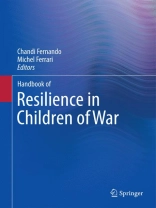Their frightened, angry faces are grim reminders of the reach of war. They are millions of children, orphaned, displaced, forced to flee or to fight. And just as they have myriad possibilities for trauma, their lives also hold great potential for recovery.
The Handbook of Resilience in Children of War explores these critical phenomena at the theoretical, research, and treatment levels, beginning with the psychosocial effects of exposure to war. Narratives of young people’s lives in war zones as diverse as Afghanistan, Sri Lanka, Columbia, and Sudan reveal the complexities of their experiences and the meanings they attach to them, providing valuable keys to their rehabilitation. Other chapters identify strengths and limitations of current interventions, and of constructs of resilience as applied to youth affected by war. Throughout this cutting-edge volume, the emphasis is on improving the field through more relevant research and accurate, evidence-based interventions, in such areas as:
- An ecological resilience approach to promoting mental health in children of war.
- Child soldiers and the myth of the ticking time bomb.
- The Child Friendly Spaces postwar intervention program.
- The role of education for war-zone immigrant and refugee students.
- Political violence, identity, and adjustment in children.
The Handbook of Resilience in Children of War is essential reading for researchers, scientist-practitioners, and graduate students in diverse fields including clinical child, school, and developmental psychology; child and adolescent psychiatry; social work; counseling; education; and allied medical and public health disciplines.
Tabela de Conteúdo
Chapter 1. Overview of the Volume; C. Fernando, M. Ferrari.- Section 1: Social-Ecological Approaches to Promoting Resilience in Children of War .- Chapter 2. Promoting Mental Health and Psychosocial Wellbeing in Children Affected by Political Violence. Part I: Current Evidence for an Ecological Resilience Approach; W. A. Tol, M. J.D. Jordans, B. A. Kohrt, T. S. Betancourt, I. H. Komproe.- Chapter 3. Promoting Mental Health and Psychosocial Wellbeing in Children Affected by Political Violence. Part II: Expanding the Evidence Base; W. A. Tol, M. J.D. Jordans, B. A. Kohrt, T. S. Betancourt, I. H. Komproe.- Chapter 4. Promoting Resilience in Children of War; B. Magid, N. Boothby.- Chapter 5. Child Mental Health, Psychosocial Wellbeing, and Resilience in Afghanistan: A Review and Future Directions; P. Ventevogel, M. Jordans, M. Eggerman, B. van Mierlo, C. Panter-Brick.- Section 2: Child Soldiers .- Chapter 6. When Children Become Killers: Child Soldiers in the Civil War in Sierra Leone; T. B. Zack-Williams.- Chapter 7. The Fallacy of the Ticking Time Bomb: Resilience of Children Formerly Recruited into Armed Forces and Groups; L. Stark, M. Wessells.- Chapter 8. Children of War in Columbia and Iraq; M. J. Buchanan, K. Al-Mashat, L. Cortes, B. Djukic, B. Jaghori, A. Thompson.- Section 3: Institutional Support for Children Affected by War .- Chapter 9. Child Friendly Spaces: Promoting Children’s Resiliency Amidst War; K. Kostelny, M. Wessells.- Chapter 10. Resilience in Orphans of War in Sri Lanka; C. Fernando, M. Ferrari.- Section 4: Resilience among Refugees .- Chapter 11. Relational Resilience; C. Dauite.- Chapter 12. Coping and Adaptation: A Narrative Analysis of Children and Youth from Zones of Conflict in Africa; J. Mc Adam.- Chapter 13. Pathways of Success Experiences Among the “Lost Boys” of Sudan: A Case Study Approach; L. Bates, D. J. Johnson, M.Rana.- Chapter 14. No Place Like Home: Resilience Among Adolescent Refugees Resettled in Australia; J. Robinson.- Chapter 15. Pathways to Resilience: The Role of Education in War-Zone Immigrant and Refugee Student Success; L. Stermac, A. K. Clarke, L. Brown.- Section 5: Extending our Understanding of the Effects of War on Children: Theory and Practice .- Chapter 16. Political Violence, Identity, and Psychological Adjustment in Children; O. Muldoon.- Chapter 17. How Can a Majority Be Resilient? Critiquing the Utility of the Construct of Resilience through a Focus on Youth in Contexts of Political Conflict; B. Barber, B. Doty.- Chapter 18. Resilience in the lives of Children of War; J. Garbarino, E. Bruyere.- Chapter 19. Evidence-Based Resilience-Enhancing Intervention Methods for Children Affected by Armed Conflict; K. Peltonen, E. Palosaari.- Conclusion .- Chapter 20. What Can be Done to Help Children of War: Informing Policy and Practice; M. Ferrari, C. Fernando.
Sobre o autor
Chandi Fernando is a Clinical and School Psychologist. She has experience working in mental health agencies and schools in Toronto and Northern Ontario, and most recently as an Adjunct Professor in the Department of Applied Psychology and Human Development at the Ontario Institute for Studies in Education, University of Toronto. She is actively involved in international research, with a focus on, risk and resilience in children and communities. Her outreach work and research involves working with orphan and refugee torture and trauma victims of war in Sri Lanka.
Michel Ferrari is a Professor in the Department of Applied Psychology and Human Development at the Ontario Institute for Studies in Education, University of Toronto. His area of interest concerns psychological well-being and identity development. He has conducted international research on how individuals understand themselves within the context of their lives and cultures and is currently leading an international study of personal wisdom in China, India, India Serbia, Ukraine, the USA and Canada. Other work has explored related themes such as self-compassion, and identity development in children with special needs, in particular those with Asperger’s Syndrome. He is editor and co-editor of several books, the most recent being, The Scientific Study of Personal Wisdom (Ferrari & Weststrate, 2013, Springer).












